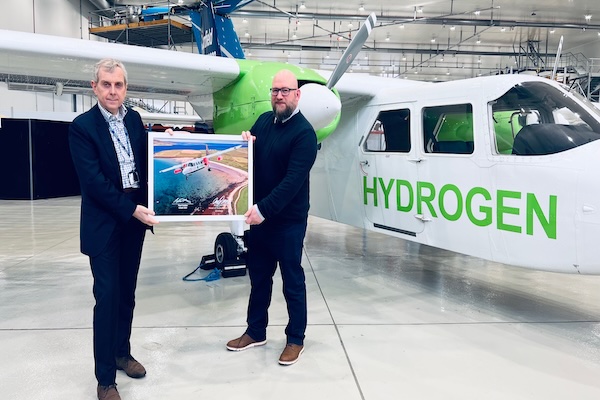Loganair is poised to make aviation history with its ambitious plan to launch the world’s first zero-emissions flights.
Partnering with Cranfield Aerospace Solutions, Loganair aims to propel the industry towards a sustainable future.
Pioneering Emissions-Free Aviation
The year 2027 is set to mark a pivotal moment in aviation history as Loganair announces plans for launching the world’s first zero-emissions flights. In collaboration with Cranfield Aerospace Solutions, Loganair aims to introduce hydrogen-electric planes on lifeline routes across the Scottish islands, a step forward for sustainable air travel.
Cranfield Aerospace Solutions and Loganair are committed to pushing the boundaries of modern aviation with their hydrogen-electric Britten-Norman Islander aircraft. This innovative project is part of a broader strategy to harness sustainable technologies and reduce the environmental impact of air travel.
Cranfield Aerospace Solutions and Loganair are committed to pushing the boundaries of modern aviation with their hydrogen-electric Britten-Norman Islander aircraft. This innovative project is part of a broader strategy to harness sustainable technologies and reduce the environmental impact of air travel.
Strategic Partnerships for Green Aviation
A key component of this ambitious project is the strategic partnership between Loganair and Cranfield Aerospace Solutions. Leveraging their combined expertise, this collaboration aims to overcome the logistical challenges associated with hydrogen-powered flight. The partnership underscores a shared commitment to achieving zero emissions in aviation.
Loganair’s Greenskies programme exemplifies its dedication to mitigating aviation’s environmental footprint. By focusing on alternative technologies and carbon offset initiatives, the programme complements Cranfield Aerospace’s efforts in developing viable sustainable aviation solutions. This alignment of goals highlights a concerted effort to pave the way for cleaner skies.
The Role of Hydrogen-Electric Technology
Hydrogen-electric technology stands at the forefront of this innovative approach to sustainable aviation. By utilising hydrogen fuel cells, these aircraft promise to eliminate carbon emissions, significantly reducing the airline industry’s environmental impact.
As hydrogen fuel becomes more viable, its application in aviation represents a pioneering endeavour with potential for global impact. Hydrogen’s high energy density and clean combustion make it an ideal candidate for the future of green aviation.
The commercial deployment of hydrogen-electric aircraft demands comprehensive advancements in infrastructure and operations. This includes everything from enhanced refuelling stations to revised maintenance protocols, a testament to the multifaceted nature of implementing such cutting-edge technology.
Operational Challenges and Solutions
Implementing hydrogen-electric flights involves navigating various operational challenges. The unpredictable weather of the Orkney Islands poses a unique test for these new aircraft, prompting the need for robust design and engineering solutions.
Collaborative efforts focus on ensuring the aircraft’s adaptability to different routes and weather scenarios, a critical factor for successful operations. Loganair and Cranfield Aerospace are spearheading solutions to address these challenges, providing a template for future aviation advancements.
A Vision for the Future of Air Travel
This project showcases an optimistic vision for the future of air travel, setting a precedent for other airlines and regions to follow.
By pioneering in zero-emissions flights, Loganair is poised to influence global standards for sustainability in aviation. The success of this project could inspire similar initiatives worldwide, encouraging investment and innovation in green aviation technologies.
Loganair, through its innovative approach and strategic alliances, demonstrates the tangible benefits of embracing sustainable practices, potentially transforming the aviation industry at large.
Loganair’s Commitment to Sustainability
Loganair’s commitment to sustainability is evident in its proactive approach to reducing emissions. The airline’s environmental initiatives are geared towards long-term positive impacts on both the industry and the communities it serves, emphasizing corporate responsibility.
Strategic plans include continuous investment in sustainable technologies and the exploration of alternative fuel sources, illustrating Loganair’s clear dedication to ensuring a cleaner, greener future for aviation.
Community and Economic Impacts
The introduction of zero-emissions flights offers intriguing economic and community benefits, particularly for the Orkney Islands. Enhanced connectivity through sustainable means could stimulate local economies and improve quality of life.
The pioneering efforts of this project demonstrate the potential of sustainable aviation to contribute positively to remote regions, offering a model for future economic development initiatives.
Loganair’s pioneering efforts in zero-emissions flight represent a significant leap towards sustainable aviation.
The successful implementation of this project could revolutionise air travel, setting a new global benchmark.

